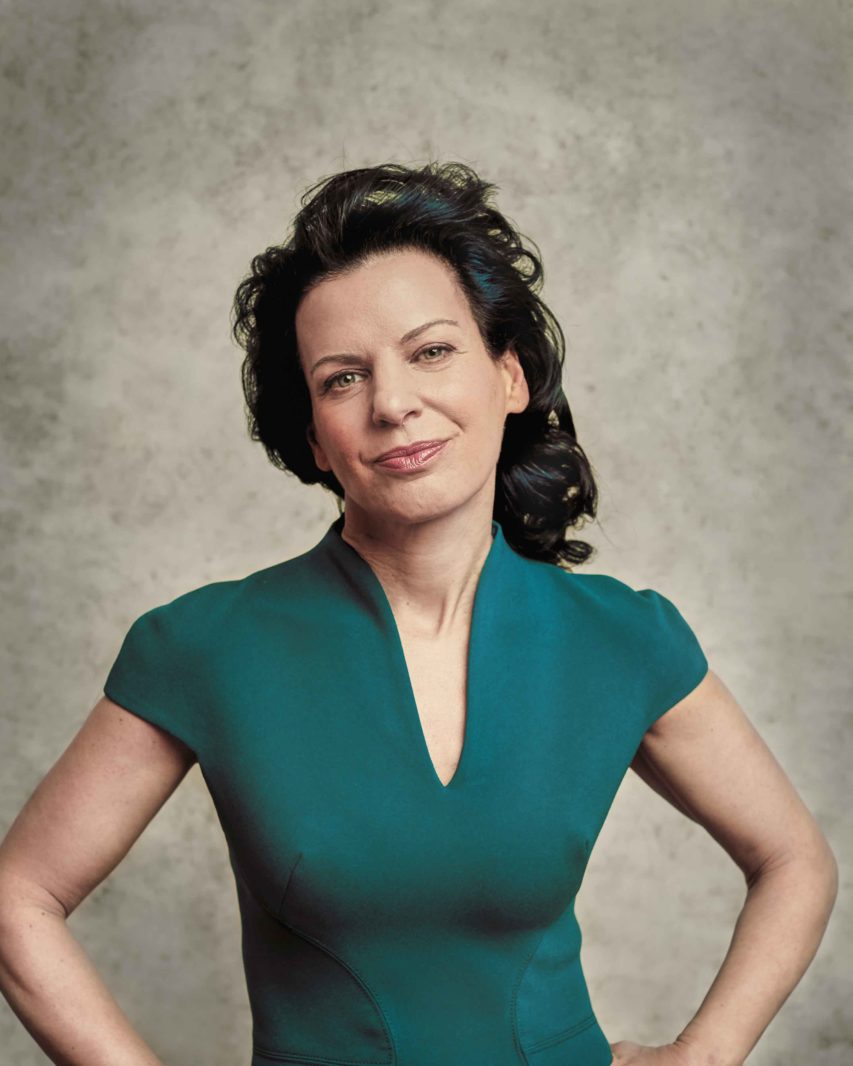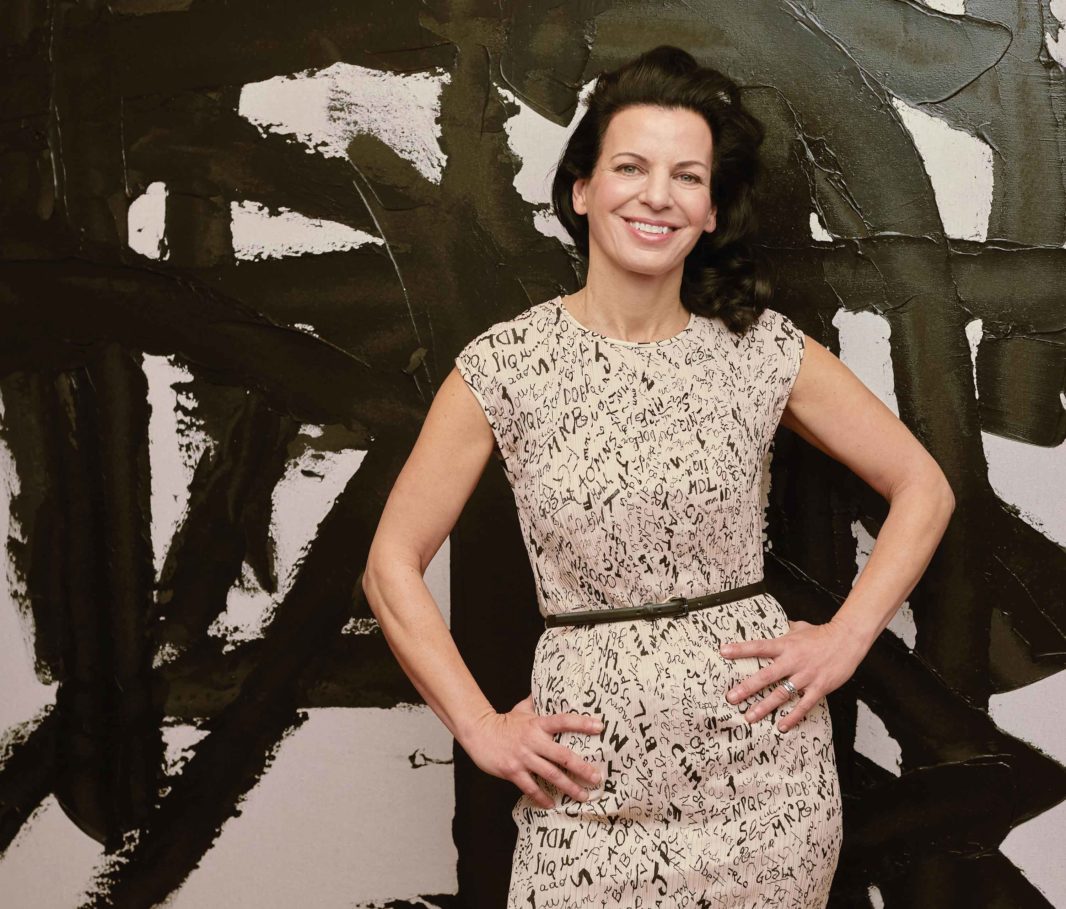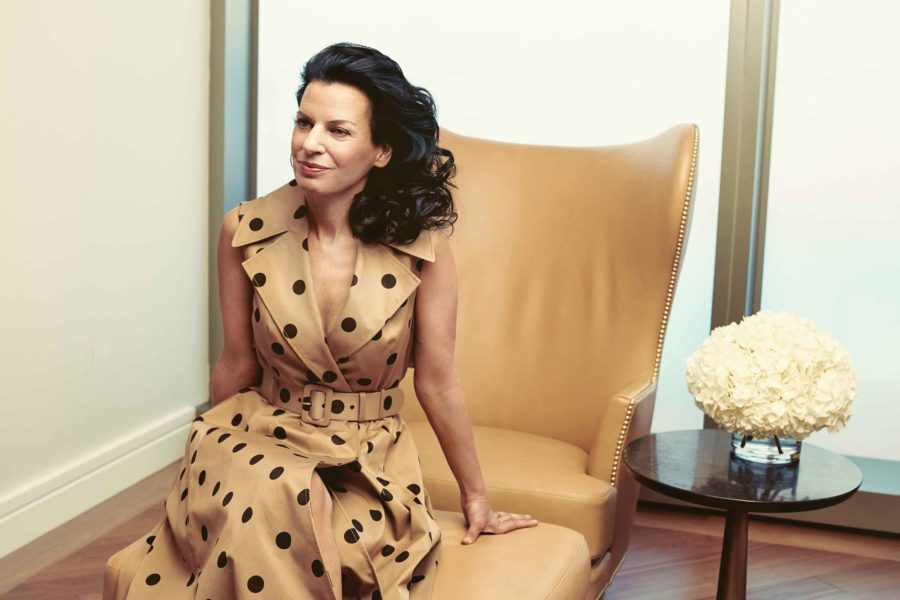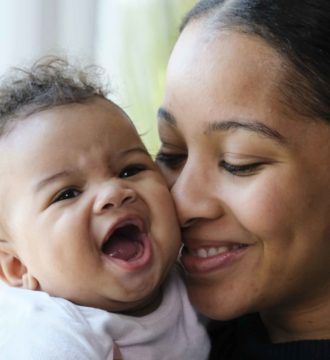Tall and telegenic, Juliette Kayyem sweeps into the amphitheater at Harvard’s John F. Kennedy School of Government to begin another chapter in her four-track career.
She has spent all morning and the early afternoon putting out brushfires at Zemcar, the ride-sharing service for kids she co-founded—pitching investors, recruiting drivers, reassuring parents—but now it’s time to don her academic mantle.
Two dozen graduate students lean forward as Kayyem, a veteran of top state and federal homeland security stints, riffs on the day’s headlines, spelling out threats real and imagined outlined in developing news stories.
A caravan of Central American migrants has just reached the U.S. border with Mexico, prompting apocalyptic warnings in tweets from the White House. A government report on the devastating economic costs of climate change, quietly released the day after Thanksgiving, is raising alarms around the country. And, a security think-tank analysis of right-wing extremism, headlined in the Washington Post, shows a surge in acts of domestic terrorism since President Trump took office.
Kayyem, an expert in disaster management who headed President Obama’s response to the 2010 BP oil spill in the Gulf of Mexico and the H1N1 flu pandemic, calmly lays out the facts while urging her charges to look beyond the stories to addressing real challenges like climate change—and not take the bait on manufactured disasters like migrants.
Close to home, says the Belfer Lecturer in International Security, the imminent threat is rising sea levels that could overwhelm Boston’s Seaport District and flood billions of dollars in coastal assets. Standing next to the lectern in a cobalt silk blouse, Kayyem declares, “We have to rethink not only what we have to do, but what government has to do. The next challenge for homeland security is building resiliency at the front end, so that we can learn and adapt from disasters.”
Kayyem’s crisp delivery is familiar to anyone hooked on cable news or WGBH public radio broadcasts. Our daily diet of disaster reporting is hardly complete without a breakdown from the 49-year-old California native, who was also a Pulitzer Prize finalist for a powerful Boston Globe series of columns about ending the exclusion of women from combat. Her media cachet was further burnished with the 2016 publication of her manifesto-as-memoir “Security Mom: An Unclassified Guide to Protecting Our Homeland and Your Home,” featuring a confident Kayyem standing, arms-crossed, on the cover, sapphire-blue eyes lit from an interior fire.
Over the last few years, the mom of three has veered off from academics, government and the media to focus on building security resilience for families facing what she calls the “pain-point” of transporting children safely and efficiently amidst the schedule crunch of school, work and activities. Along with technology guru Bilal Khan, Kayyem co-founded Zemcar two years ago to serve the Boston area. By the opening of the first quarter of 2019, the startup had logged 1,500 total rides, averaging about $25 each, while exploring expansion to new markets.
As the busy chief executive officer of the six-employee enterprise, Kayyem has raised close to $1.5 million from angel investors, overseen the rigid screening process for hiring some 100 drivers, and guided the licensing of the company’s technology platform. Zemcar—the first three letters signify “Zone of Empowerment”—allows parents to live-stream their children’s rides on an app, providing a measure of security in the “Uber for kids” service unavailable from other ride-sharing companies. “I can just watch the video, and it gives me a sense of ease because I know where the car is going,” she says.
That feature is especially attractive to firms involved in transporting seniors and other sensitive mobility tasks. Zemcar has also attracted notice for its hiring practices: 76 percent of its drivers are women, compared with 9 percent for Uber. Its technology protects not just passengers, but drivers, as well, offering a more secure platform for women in the gig economy.

PHOTOGRAPHY BY KOLBY KNIGHT
Juliette Kayyem chauffeurs safe rides for kids with her latest endeavor, Zemcar
Origins of a Plan
“The best CEO is one who experiences the pain-points,” says Kayyem, speaking in her Kennedy School office in Cambridge. “We have three kids and live in the city, and moving them from point A to point B became a horror. Uber and Lyft were just not the right models.” Several years ago, Kayyem met Khan, who had experienced the same frustration when googling “Uber for kids” to find a ride for his children while his wife was undergoing dental surgery, and he was delayed in New York City.
“He had the technology background, and I brought in the security expertise. The technology platform makes the company really unique and applicable to other mobility companies,” she adds. Just recently, Zemcar’s technology spin-off, Grip Mobility, signed a partnership with Mapbox, a custom-provider of online maps for such technology giants as Facebook and Snapchat. Meanwhile, Zemcar itself is considered a possible target for acquisition by out-of-state competitors looking for a foothold in the lucrative Boston market.
Directional certainty, a requirement of Zemcar’s business model, wasn’t always a feature of Kayyem’s career. As she puts it repeatedly in her memoir, “Sh-t happens.” After graduating from Harvard Law School, she moved to Washington with her husband, David Barron, whom she had met at age 19 at the Harvard-Yale football game, to work under future Massachusetts Gov. Deval Patrick in the Civil Rights Division of the U.S. Justice Department during the Clinton administration. Her portfolio included desegregation cases, litigation to open up the Citadel and the Virginia Military Institute to female cadets, and the federal government’s first bullying case.
When Attorney General Janet Reno needed an experienced civil rights attorney to help review the impact of prosecutions under the Omnibus Counterterrorism Act, she turned to Kayyem, the daughter of Lebanese immigrant families and the highest-ranking Arab-American in the Justice Department. Kayyem’s deep dive into “secret evidence cases” brought under the act—passed in the aftermath of the 1995 Oklahoma City domestic terrorism bombing—drew her into the national security apparatus and conferred on Kayyem the title of “terrorism expert.”
When Barron, who had been working in the Justice Department’s Office of Legal Counsel, was offered a faculty position at Harvard Law School, the couple packed up and moved to Cambridge, but Kayyem continued her work with Reno. In 1999, House Minority Leader Richard Gephardt appointed Kayyem to the 10-member National Commission on Terrorism in the wake of the embassy bombings by Al Qaeda. News organizations took notice of an Arab-American Christian, married to a Jewish lawyer, holding a sensitive security post.
Protecting a Nation
Serving with senior figures like future Iraq overlord L. Paul Bremer and former CIA chief Jim Woolsey, she traveled the world as part of the process of producing a report warning of the nation’s lack of preparation to deal with a major terrorist crisis. She went on news programs and met with reporters to defend the commission findings and soon found herself as a security research fellow at the Kennedy School.
The low-profile academic post sling-shotted Kayyem into pundit stardom when 9/11 hit. Her first child, Cecilia, had been born just a few months before. “I was the expert,” writes Kayyem in
“Security Mom,” “giving history lessons about Afghanistan and Saudi Arabia and homeland security planning. I explained how the Taliban had offered a safe haven to bin Laden, as their agendas—destructive Islamic extremism—were similar.”
Kayyem played a similar explanatory role when two young Chechens, who lived just a few blocks away from her family home near Central Square, ignited pressure-cooker bombs at the finish line of the 2103 Boston Marathon. By then, two more children had joined the household—Leo in 2003 and Jeremiah in 2005—and her husband had been appointed as a federal appeals court judge.
In between the two disasters, she served as homeland security adviser under Gov. Patrick and then as assistant secretary of homeland security under President Obama. One of the lasting impacts in her federal posting—introduced during the flu pandemic—was instructing Americans to sneeze into the elbow to minimize the spread of germs. The jobs were demanding, stressful and made possible by help from family and friends in raising her kids.
In looking back on her homeland security work in her book, Kayyem notes that the constant chorus of “Never Again” and “Keep Calm” pronouncements eventually rang hollow. “If ‘Never Again’ risked convincing the nation that invulnerability was an achievable goal, ‘Keep Calm’ risked convincing the nation that we should simply stop trying to reduce those vulnerabilities. Every aspect of the approach is wrong, including its history,” she writes.

PHOTOGRAPHY BY KOLBY KNIGHT
Juliette Kayyem chauffeurs safe rides for kids with her latest endeavor, Zemcar
Proper Planning vs. Poor Performance
The better approach, she argues, is to educate yourself and take control of what you can do—in other words, achieve what she calls “grip”—to protect both the homeland and the home, starting with simple things like keeping a first aid kit and establishing emergency protocols. “There have always been epidemics, plagues and other horrible things happening that we have to address. What I’ve discovered, especially in the years out of government, is how much I had been mistaken about how we should think about our own safety and security. It’s not just the big, bad things—terrorism, hurricanes. It’s the cousin who’s dying of opiates, the brother who got shot up in a school—the things that have to be addressed as if they were emergency management crises,” she says.
Kayyem’s extensive corporate consulting work includes strategies to limit the flood of opiates, especially fentanyl, pouring into the country, and she continues to urge schools to adopt active shooter protocols in schools and parents to teach their kids what they can do to stay safe, whether from guns or climate change. “Don’t infantilize our children,” she says. “We need to prepare them so they can better change the way the world works.”
Kayyem’s mitochondrial furnace works overtime to produce the energy she puts into work and home. It gets recharged by running, walking her Lab-mix Nola around the neighborhood, and a new passion for Peloton. In the summer, she packs a surfboard for waves off Little Compton and Narragansett beaches in Rhode Island. With her oldest child leaving for college, the homestead will be little quieter. But she’ll find ways of filling in the gap, including another possible stint in government or maybe even a run for office.
Her one and only attempt was a run in the 2014 Democratic gubernatorial primary in Massachusetts. It didn’t end well. “I’m a little bit of a law-and-order Democrat. I feel like I’m progressive, but I don’t think people perceive me that way because I’m not for abolishing ICE, and I’ve always worked across the aisle,” she says.
Back at her office, Kayyem sits with her students listening to a former Kennedy School national security fellow on the phone from Mexico, describing the migrants milling around the border in Tijuana. A photograph of Kayyem and her family on the South Lawn with President Obama sits on the shelf. She’s scheduled to debate immigration policy in a few hours on CNN. Her eyes light up as her former colleague shares insights that will go into her blistering evisceration of her counterpart’s doom-and-gloom assessment of the so-called migrant threat.
“We’re a country of 350 million. This is madness,” she says. “It’s not an existential threat. It is not war. We can do better. We can build a better society.”
One safe ride at a time.



 9 min read
9 min read


